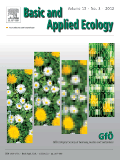
BASIC AND APPLIED ECOLOGY
Scope & Guideline
Innovating insights for a healthier planet.
Introduction
Aims and Scopes
- Biodiversity and Conservation:
The journal emphasizes research on biodiversity patterns, conservation strategies, and the ecological implications of biodiversity loss. Studies often explore species interactions, habitat requirements, and the effectiveness of conservation measures in various ecosystems. - Ecosystem Functioning and Services:
Research on ecosystem services, including pollination, nutrient cycling, and habitat provision, is central to the journal. Papers typically examine how ecological processes contribute to ecosystem stability and human well-being. - Climate Change and Environmental Change:
The impacts of climate change on ecological dynamics and species distributions are a significant focus. The journal publishes studies assessing how changing climatic conditions affect biodiversity, ecosystem processes, and conservation strategies. - Agricultural Ecology and Agroecology:
The journal includes research on agricultural practices and their ecological consequences, highlighting sustainable practices that reconcile agricultural productivity with biodiversity conservation. - Urban Ecology:
Research addressing ecological dynamics in urban environments is increasingly prominent, focusing on the interactions between urbanization and biodiversity, ecosystem services, and human well-being. - Methodological Innovations:
BASIC AND APPLIED ECOLOGY encourages the development and application of novel methodologies for ecological research, including remote sensing, molecular techniques, and statistical modeling.
Trending and Emerging
- Urban Ecology and Biodiversity:
Recent papers highlight the importance of urban environments as critical habitats for biodiversity, exploring how urban design and green spaces can enhance ecological connectivity and support diverse species. - Climate Adaptation Strategies:
Research focusing on adaptive management strategies for ecosystems under climate change is on the rise. This includes studies examining resilience mechanisms in species and ecosystems to inform conservation practices. - Ecological Impacts of Anthropogenic Factors:
There is an increasing emphasis on understanding how human activities, such as agriculture, urbanization, and pollution, impact ecological dynamics and biodiversity. Studies often explore mitigation strategies and restoration efforts. - Interdisciplinary Approaches to Ecology:
The journal is increasingly publishing interdisciplinary research that integrates ecological science with social sciences, economics, and policy-making, reflecting a holistic approach to addressing ecological challenges. - Technological Innovations in Ecology:
Emerging technologies, including remote sensing, big data analytics, and molecular tools, are being utilized to enhance ecological research methodologies, leading to innovative studies that provide new insights into ecological processes.
Declining or Waning
- Traditional Taxonomy and Species Inventory:
Research focused solely on traditional taxonomic classifications and species inventory appears to be declining, likely due to the increasing emphasis on functional ecology and ecosystem services. - Historical Ecology:
Studies that primarily focus on historical ecological baselines without integrating current ecological dynamics and conservation implications are less frequently published, reflecting a shift towards more applied and contemporary ecological research. - Single-species Studies:
There is a noticeable reduction in single-species studies that do not address broader ecological interactions or community dynamics. The journal is moving towards research that emphasizes multi-species interactions and ecosystem-level processes. - Static Models of Ecological Processes:
Research employing static or simplistic models to describe ecological processes is becoming less common, as the journal increasingly favors more dynamic and integrative approaches that capture the complexity of ecological interactions.
Similar Journals
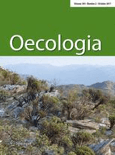
OECOLOGIA
Fostering Innovative Research in Ecological DynamicsOECOLOGIA is a prestigious journal dedicated to the interdisciplinary fields of ecology, evolution, behavior, and systematics, published by Springer. Established in 1968, this journal has consistently contributed to the scientific community, maintaining a strong impact factor reflected in its Q1 ranking within its category for 2023, and an impressive 79th percentile among 721 journals in the Scopus rank for Agricultural and Biological Sciences. With a commitment to advancing ecological knowledge and fostering innovative research, OECOLOGIA serves as a vital platform for researchers, professionals, and students exploring complex ecological dynamics and evolutionary processes. Although it does not offer open access, the journal remains dedicated to high-quality, peer-reviewed publications that inspire and inform the next generation of ecological science. For those interested in the latest trends and significant findings in biology and ecology, OECOLOGIA is an essential resource that continues to shape the discourse and understanding in these critical fields.

Global Ecology and Conservation
Leading the way in ecology and conservation science.Global Ecology and Conservation, published by Elsevier, stands as a premier open-access journal dedicated to advancing the field of ecology and conservation science. Since its inception in 2014, the journal has facilitated the dissemination of high-quality research, fostering critical dialogue on ecosystem management, biodiversity preservation, and sustainability practices across the globe. With a remarkable ranking within the top quartiles (Q1) in various categories including Ecology, Evolution, Behavior and Systematics, and Nature and Landscape Conservation, it is positioned among the leading resources for researchers and professionals alike. The journal has garnered a notable impact, ranking #65 out of 721 in Ecology, and houses articles that are vital to understanding and addressing the pressing environmental challenges of our time. Available in an open-access format, researchers can freely access and share vital findings, promoting a collaborative approach to ecological research. Global Ecology and Conservation is not just a publication; it is a critical tool for innovation and advocacy in conservation, poised to inspire the next generation of environmental stewards.

LANDSCAPE ECOLOGY
Exploring the Interconnections of Nature and SocietyLANDSCAPE ECOLOGY, published by SPRINGER, is a premier journal dedicated to the field of landscape ecology, bringing together innovative research that intersects ecology, geography, and conservation. With a prestigious history since its inception in 1987, this journal showcases high-impact studies reflected in its impressive 2023 rankings in the first quartile of Ecology, Geography, Planning and Development, and Nature and Landscape Conservation categories. Operating from the Netherlands, LANDSCAPE ECOLOGY serves as a critical platform for scholars and practitioners aiming to advance their understanding of spatial analysis, environmental challenges, and landscape management. While the journal operates on a traditional access model, the quality and rigor of published research ensure it remains a vital resource for the academic community, inspiring a deeper exploration of our dynamic natural environments and the socio-ecological interactions within them.
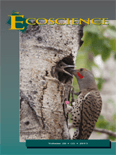
ECOSCIENCE
Driving innovation in ecological research and conservation.ECOSCIENCE, published by Taylor & Francis Inc, stands as a prominent journal in the fields of Ecology and Environmental Science, recognized for its commitment to advancing knowledge since its inception in 1994. With an ISSN of 1195-6860 and an E-ISSN of 2376-7626, the journal caters to a diverse audience of researchers, professionals, and students passionate about ecological and environmental issues. In 2023, it achieved Q2 and Q3 rankings in the Scopus category of Ecology and Evolution, Behavior and Systematics, reflecting its significance within the academic community. Moreover, ECOSCIENCE occupies notable positions in Scopus rankings, including Rank #324 in Agricultural and Biological Sciences and Rank #210 in Environmental Science, symbolizing its role as a catalyst for disseminating high-quality research. Although currently not open access, the journal's multifaceted scope encourages in-depth discussions on ecological diversity, conservation strategies, and sustainable practices, making it an invaluable resource for those engaged in ecological research and practice.

Ecologies
Exploring the intricate web of life and its environmental implications.Ecologies is a dynamic open-access journal published by MDPI, based in Switzerland, which focuses on the interdisciplinary study of ecological and environmental sciences. Since its inception in 2020, the journal has made significant strides in contributing to our understanding of complex ecological interactions, evolutionary processes, and the implications of biological diversity on ecosystem functionality. With its categorization in Q2 for Ecology and various Q3 rankings in related fields, it proudly offers a platform for innovative research that aims to address pressing ecological challenges. Researchers, professionals, and students can benefit from its comprehensive and insightful articles that are freely accessible, ensuring that critical findings are disseminated widely to facilitate informed decision-making and foster collaboration across disciplines. With the impact of climate change and biodiversity loss at the forefront of global discussions, Ecologies plays a pivotal role in shaping the future of ecological research and policy implementation.
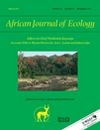
AFRICAN JOURNAL OF ECOLOGY
Driving Innovation in Ecology and SystematicsThe African Journal of Ecology, published by Wiley, is a leading academic journal in the field of Ecology, Evolution, Behavior, and Systematics. Established in 1963 and continuing its vital contributions to the field until 2024, this journal serves as a premier platform for researchers and scholars to share groundbreaking studies that explore the intricate relationships within ecosystems, particularly in the African context. With an impressive Scopus Rank of #423 out of 721 and a Q3 Quartile ranking, it stands as a credible source of scholarly information, gaining recognition among peers for its rigorous peer-review process and impactful publications. While the journal is not open access, it remains influential in driving advancements in ecological research and providing insights vital for conservation efforts and biodiversity studies. Authors and readers alike will find that the African Journal of Ecology not only promotes scientific inquiry but also fosters a deeper understanding of ecological dynamics that affect our world.
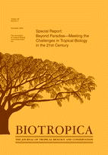
BIOTROPICA
Shaping biodiversity insights for tomorrow's challenges.BIOTROPICA is a premier journal published by Wiley, specializing in the fields of Ecology, Evolution, Behavior, and Systematics. With a robust impact factor and positioned in the Q1 category in its field, it stands out as a leading source of research that informs and shapes our understanding of biodiversity and ecosystem management. Since its inception in 1979, BIOTROPICA has been dedicated to publishing high-quality articles that advance scientific knowledge and foster conservation efforts globally. Researchers and professionals alike value the journal for its rigorous peer-review process and its influence in academic discourse, demonstrated by its Scopus ranking placing it in the 70th percentile among its peers. While the journal does not currently offer open access, it continues to be a vital resource for those engaged in the study of biological systems, making significant contributions to the advancement of ecological science. Readers can expect to find a wealth of innovative research and perspectives that are critical to addressing contemporary environmental challenges.

ECOLOGY LETTERS
Exploring the depths of ecological science for a sustainable tomorrow.ECOLOGY LETTERS, published by Wiley, is a premier journal dedicated to advancing the field of ecology and related disciplines. Renowned for its rigorous peer-review process and impactful research contributions, the journal boasts an impressive Scopus Rank of #13 out of 721 in the category of Agricultural and Biological Sciences, positioning it in the 98th percentile globally. With a Q1 rating in the 2023 quartile rankings for Ecology, Evolution, Behavior and Systematics, it serves as an essential platform for ecologists and evolutionary biologists to disseminate cutting-edge research findings from 1998 to 2024. Although not an open-access journal, ECOLOGY LETTERS actively contributes to the global ecology discourse, making it a critical resource for researchers, professionals, and students dedicated to understanding complex ecological interactions and evolutionary processes.

Ecosistemas
Unveiling the dynamics of nature through collaborative study.Ecosistemas is a prominent Open Access journal published by the ASOCIACION ESPANOLA ECOLOGIA TERRESTRE, specializing in the field of ecology. Since its inception in 2001, it has dedicated itself to advancing ecological knowledge and research, fostering an inclusive platform for the dissemination of cutting-edge studies that span ecological interactions, sustainability, and biodiversity. The journal, based in Spain, has established its reputation with notable rankings such as Q3 in the field of Ecology and Q4 in Ecology, Evolution, Behavior, and Systematics, reflecting its commitment to quality research. With a Scopus Ranks position placing it in the 40th and 37th percentiles for its categories, Ecosistemas is integral to the academic community, serving researchers, professionals, and students alike. It provides a vital resource for those seeking to understand ecological dynamics and environmental challenges, facilitating open access to important findings and discussions that shape the future of our ecosystems.

GLOBAL ECOLOGY AND BIOGEOGRAPHY
Fostering Knowledge for Conservation and Global ChangeGLOBAL ECOLOGY AND BIOGEOGRAPHY is an esteemed academic journal published by Wiley that focuses on the dynamic interplay between ecological and biogeographical processes across the globe. With a strong commitment to advancing our understanding of biodiversity, conservation, and global change, this journal has secured a prestigious Q1 ranking in several categories, including Ecology, Ecology, Evolution, Behavior and Systematics, and Global and Planetary Change, highlighting its significant influence in the field. Since its inception in 1998, the journal has consistently provided a platform for high-quality research, featuring original articles that address critical ecological questions and emerging biogeographical trends. Researchers aiming to publish impactful work will appreciate the journal's rigorous peer-review process and its accessibility to a global audience. With a commendable track record reflected in its Scopus rankings, this journal is an essential resource for anyone dedicated to the study of ecology and biogeography.